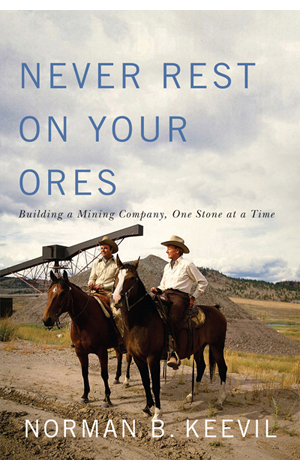
Reflections on Vancouver, British Columbia and other topics, related or not
When B.C.’s NDP
wanted coal mining—
and to run the business itself
An industry insider reveals 1970s
New Democrat tactics of resource nationalism
Greg Klein | September 29, 2017
The year was 1973. No sooner had Teck Resources transplanted its HQ to Vancouver than British Columbia premier W.A.C. Bennett’s 20-year reign fell to defeat at NDP hands. Resource nationalism proved to be one of new premier Dave Barrett’s earliest enthusiasms. But the guy who bragged about his commitment to doing “what was needed and right” showed a peculiar modus operandi.
That’s just one of the stories related by Norman B. Keevil in a history of Teck to be released next week, Never Rest on Your Ores: Building a Mining Company, One Stone at a Time.
Keevil relates that on summoning him and Bob Hallbauer into the premier’s Victoria office, Barrett’s first words were, “I want your coal.”

Interest had been growing in northeastern B.C.’s deposits, among them Teck’s Sukunka. “Well, at least he did call it our coal,” Keevil notes. “That would become questionable as the situation evolved.”
The duo declined but Barrett wouldn’t give up. He kept calling them back to Victoria on an almost weekly basis.
At about the seventh such meeting, a very strange thing happened. Barrett had a curtain angled across a corner in his office. We’d never paid much attention to it, but in that seventh meeting the curtain rustled a bit, and a thin, sepulchral, white-haired professorial type jumped out from behind it. It was almost as though he was wearing a superhero cape, or super-villain. I think Dave must have gotten him out of Marvel Comics. Was there a door to another room behind the curtain, or had this strange figure just been hiding behind it, taking it all in? I never did find out.
It turned out this was the patrician Alex Macdonald, Barrett’s attorney general and the upholder of law and order—the NDP way. The honourable gentleman said to us: ‘I want you to understand just one thing. I guarantee that you will never be able to put that coal property into production. All you have is an exploration licence and, if you don’t sell to us right now, I’ll cancel it tomorrow.’
Calling it an “unseemly ultimatum from the upholder of justice,” Keevil states the company reluctantly agreed on a $20-million sale that would close in June, a few months away.
But when June arrived, the government announced it had “dropped its option,” writes Keevil—who insists that it wasn’t an option but a firm deal.
Musing over the new government’s equivocation, Keevil wonders if it just came down to money: “Certainly they had been spending like drunken sailors on redecorating some of the higher-profile, cabinet ministers’ offices.
“As to Alex Macdonald, a quote of his survives all of this: ‘In politics, your opponents are on the other side of the legislature, but your enemies are all around you.’ With him, I’m not too surprised.”
Viewing that vignette in a wider context, Keevil sees much of the mining world as chaotic for much of the 1970s and early ’80s, whether it was in B.C., Panama, Chile, El Salvador or Saskatchewan. Compounding the mess were peripheral problems ranging from the OPEC oil embargo to Trudeauvian taxes.
But as for Sukunka, it never did go into production. Teck lost interest and, with intercession from pre-prime ministerial Jean Chretien (he simply picked up the phone and ordered the Foreign Investment Review Agency to back off), unloaded it on BP. That company eventually abandoned the project.
Yet the BP deal let Teck retain 100% of the adjacent Bullmoose project. Partly thanks to new infrastructure from a new B.C. government, Bullmoose became Teck’s first coal mine. Now Canada’s largest diversified resource company is also the world’s second-largest supplier of seaborne steelmaking coal.